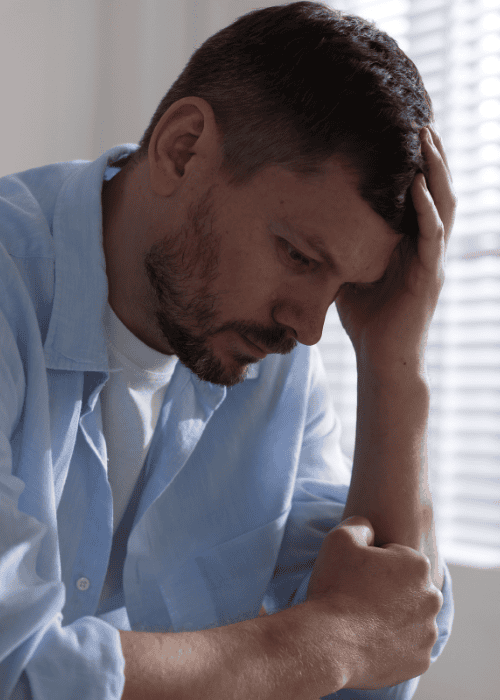Hopelessness in Adults: What It Is and How to Cope

Hopelessness is a deep, heavy feeling that nothing in your life will ever get better. That no matter what you do, the future holds no light.
It’s one of the most common symptoms of major depressive disorder and has been shown to strongly predict suicidal thoughts and behavior.1
In addition, hopelessness affects your entire body. It disturbs your sleep, weakens your immune system, changes your appetite, and worsens your physical strength. This physical and emotional exhaustion creates a painful cycle, where depression makes you feel hopeless, and hopelessness deepens your depression.
Fortunately, hopelessness is not permanent. A mental health professional can help you get to the root of the issue and find your light. This page can also help you understand hopelessness mental health issues by covering:
- What hopelessness is and the different types
- Why people can feel hopeless
- If hopelessness is linked to mental health conditions
- The consequences of ongoing hopelessness
- How hopelessness is diagnosed
- Hopelessness treatment options
- Where to find professional support

What Are the Different Types of Hopelessness?
It may seem like an odd place to start, as we all know what it’s like to stumble on oua
Hopelessness can be of many types, such as:
- Situational hopelessness: This springs from a clear, often recent event, such as losing a job, a sudden illness, the end of a relationship, or a natural disaster.
- Existential hopelessness: This is a deeper sense that life lacks meaning, purpose, or reason to go on. People describe it as an aching emptiness or the conviction that nothing matters.
- Learned hopelessness: Historically called “learned helplessness,” this is a cognitive pattern that develops when people repeatedly experience events they cannot control. Repeated uncontrollable stressors can teach a person to stop trying even when change is possible.
- Reactive hopelessness: A sudden-onset hopelessness in reaction to a traumatic or overwhelming event (for example, a severe injury or war).
- Cultural or collective hopelessness: When an entire community feels that its future won’t get better. This shared sense of futility develops due to persistent discrimination, poverty, or political oppression.
- Chronic hopelessness: This is persistent over months or years. It strongly predicts severe depression and suicidal behavior.
Evidently, there are many types of hopelessness, which may give you some insight into your experiences. However, it may be worth further considering why you might be feeling this way.
Why Do You Feel Hopeless
There can be many factors underlying hopelessness.
When people face setbacks over and over that they can’t stop, they can become conditioned to believe that nothing they do will help. This pattern is also linked to depressive thinking.2
Next, major depression brings hopeless thoughts as a core symptom. Many biological systems disrupted in depression (including brain chemicals like serotonin and dopamine) have an impact on feelings.3
Prolonged stress can also worsen your outlook on life. Ongoing stress from work, caregiving, bullying, financial strain, or unsafe environments gradually wears your body down.4 Over months and years, this “wear-and-tear” produces a steady sense that your life will never improve.
Also, traumatic events like a violent assault, the unexpected death of someone close, or a natural disaster can trigger an intense, immediate hopelessness. Although the majority of people struck by trauma recover on their own, some develop long-lasting conditions that need treatment.
Lastly, humans are social creatures. When you lose your relationships, your source of comfort is lost. Therefore, loneliness and lack of social support are strongly linked to feelings of hopelessness.5
Is Hopelessness Associated With Mental Health Conditions?
Yes, chronic hopelessness is associated with multiple mental health conditions.
Feeling like your future won’t get better or that your efforts won’t change anything is a core part of major depressive disorder. Studies using the Beck Hopelessness Scale report that people with more severe depression tend to score higher for hopelessness.6
Hopeless thinking behaviors also rise during depressive or mixed phases of bipolar episodes. Studies of people with bipolar disorder find that hopelessness is especially high when the illness is in its depressive state. And when hopelessness is present, it increases vulnerability to suicidal behavior.7
Further, post-traumatic stress and trauma-related mental health conditions are also linked with hopelessness. In fact, research identifies hopelessness as a risk factor for more severe post-traumatic stress disorder (PTSD) symptoms.8
Research also shows that hopelessness can explain suicidal thinking in people who are experiencing psychosis.9
The Consequences of Ongoing Hopelessness
Hopelessness often has far-reaching consequences. It can affect your work, relationships, and mental, physical, and emotional health. The following sections take a closer look at these consequences.
Health Consequences
People who feel hopeless for long periods have higher rates of heart disease, weakened immunity, and chronic pain.
In a study, adults who felt persistently hopeless were found to have a higher risk of heart attacks and being diagnosed with cancer compared to those who felt more hopeful.10
Scientists believe this happens because hopelessness keeps your body in “stress mode.” Your brain releases more of the stress hormone cortisol, which also has a direct impact on your sleep and appetite.
Poor sleep due to stress can then throw off your mood-regulating chemicals like serotonin and dopamine, making the hopelessness worse.11
Hopelessness also makes it much harder to care for your body day-to-day. When you believe that nothing will improve your life, taking care of your body also often feels pointless. You may want to skip doctor’s appointments or stop managing chronic conditions. This is not a lack of willpower, but rather a deep conviction that your effort won’t make a difference.
Impact on Relationships
In a study, hopelessness was linked to increased relationship strain and poorer communication among couples.12 Another study found that hopelessness predicts social withdrawal even more strongly than sadness itself.13
In support of this, studies have also found that people who feel hopeless or severely depressed report lower relationship satisfaction.14 There are also higher instances of these people getting into conflicts.
Some ways hopelessness can affect your relationships include:
- Avoiding calls or texts because you don’t know what to say.
- Feeling overwhelmed by social events.
- Conversations becoming shorter, flatter, and more about “getting through” than truly sharing your thoughts.
- Becoming irritated more easily.
- Difficulties with intimacy, both physical and emotional.
- Starting to believe loved ones would be better off without you.
- Feeling guilty for being distant, but the guilt only pushes you further away.
Effects on Productivity and Daily Functioning
Hopelessness can have a deep impact on how people function day to day. For one thing, it often makes it hard to plan or look ahead. Because it’s rooted in the sense that the future is closed off, people struggling with hopelessness may stop setting goals.
Research shows that hopelessness can also reduce concentration, memory, and motivation, the three things we rely on to stay productive.15 The mental energy that could be used for problem-solving or focus is instead spent on managing emotional exhaustion.
Additionally, it may lead to a process psychologists call “cognitive slowing,” where your brain feels “foggy” all the time.
A study also found that employees experiencing high levels of hopelessness and depressive symptoms reported significantly lower job satisfaction.16 Another study on university students showed that hopelessness was strongly correlated with academic disengagement.17
How Is Hopelessness Diagnosed Clinically?
Hopelessness is not always easy to describe by the person experiencing it, and therefore, not easy to diagnose. It takes a detailed clinical interview to understand someone’s unique feelings and experiences. During this discussion, clinicians typically ask the following:
- When your hopeless feelings first started.
- What the future looks like to you right now.
- Whether you’ve lost interest in things you used to enjoy.
- How your sleep and appetite have been lately.
- If you’ve noticed changes in your energy.
- Whether there have been any major stresses, losses, or life changes recently.
- If you’re experiencing thoughts about not wanting to live.
- What kinds of support you have, including your friends, family, and community.
- If you’ve tried anything that helps you feel a little better.
- Whether you have any history of mental health struggles or treatment in the past.
- How your physical health has been.
A widely used tool for understanding hopelessness more precisely is the Beck Hopelessness Scale (BHS), developed by the psychologist Aaron T. Beck and his colleagues. It’s a short, self-report questionnaire with 20 true-or-false statements. It measures how much a person expects negative outcomes in the future.18
Each answer on the Beck Hopelessness Scale contributes to a score. The total score ranges from 0 to 20. The higher the number, the greater the hopelessness.
How to Cope with Hopelessness
How someone copes with hopelessness may come down to a process of trial and error. This is because the causes of hopelessness can differ from person to person, and some people may respond better to certain approaches than others. Having said as much, the following are a few ways to cope with hopelessness.
Reframe Negative Thinking Patterns
During phases of hopelessness, your mind often automatically jumps to the worst possible outcome and treats it as if it’s already true. This process is known as “catastrophizing.”
For example, if you miss one deadline, your brain might tell you you’ll lose your job. Or, you have a disagreement with someone you love, and suddenly you’re sure they’ll leave you.
Reframing such thoughts requires you to notice when they show up. Anytime you find yourself in such a thinking pattern, you need to gently question it. You don’t have to suppress it entirely; just ask yourself if it is truly the only possible outcome, or if there are any other explanations.
This process also forms the basis of cognitive behavioral therapy (CBT), known to reduce hopelessness and emotional distress.
Care for Your Body and Environment
Your body and mind are deeply connected. When your body is under stress, it sends signals to your brain that something is wrong, and your thoughts often follow that lead.
Studies have shown that small, consistent physical actions like stretching, walking, or improving your sleep routine can help with hopelessness.19
You can start with the following simple acts of care that don’t demand much energy but still send a signal of life back into your day:
- Drinking a full glass of water first thing in the morning.
- Stepping outside for a few minutes of sunlight and fresh air.
- Taking a slow walk around your block.
- Making yourself a nourishing meal instead of skipping food.
- Stretching your arms, shoulders, or back whenever tension builds in your body.
- Going to bed at a regular time, even if sleep doesn’t come easily.
- Turning off your phone for a short while to rest your senses.
- Turning to your friends and family for social support.
Practice Mindfulness
People who practice mindfulness regularly experience measurable decreases in hopelessness and rumination. This is because being in the present moment eases hopelessness by gently pulling you out of the exhausting mental space that feeds it.
When you feel hopeless, your mind often replays old mistakes or imagines a future that feels empty or unbearable. The present moment, by contrast, is rarely as unbearable as your thoughts make it seem.
Here are a few gentle ways to try being more mindful:
- Take three slow, deep breaths whenever you notice your thoughts racing.
- Sit quietly for a minute and notice one sound, one smell, and one physical sensation around you.
- Do one simple task with your full attention, like making tea or folding laundry.
- Before bed, notice five things you can see, four you can touch, three you can hear, two you can smell, and one you can taste.
Seek Professional Support
In some cases, hopelessness is a sign of an underlying mental health condition like depression, anxiety, bipolar disorder, or post-traumatic stress disorder. When this is the case, no amount of self-help or willpower alone can make it go away.
A mental health professional, such as a psychologist, psychiatrist, or licensed therapist, can help you with this kind of hopelessness. Therapy is the first line of care for hopelessness associated with depression and stress.
Cognitive behavioral therapy is one of the most effective approaches for hopelessness and depression. It helps you identify the negative thought patterns and teaches you to replace them with more balanced, realistic ways of thinking.
Dialectical behavior therapy (DBT) combines mindfulness with emotional regulation and distress tolerance skills. It is effective for people who experience hopelessness linked to trauma or borderline personality disorder.
Acceptance and commitment therapy (ACT) focuses on accepting painful thoughts without letting them control your actions.
Some medications, such as selective serotonin reuptake inhibitors (SSRIs) or serotonin-norepinephrine reuptake inhibitors (SNRIs), can also be used to balance brain chemistry. However, these typically work best in conjunction with therapy.
Mission Connection Healthcare: Here to Help You Feel More Hopeful
Mission Connection Healthcare offers personalized, evidence-based treatment plans for chronic hopelessness. Our team of compassionate professionals takes the time to listen and understand your story. We then include psychotherapy, medication management, and holistic wellness approaches that meet your unique needs.
We believe that recovery is more than symptom management; it includes rebuilding hope and meaning in your life.
Reach out to us today if you’re ready to start working toward a more hopeful future.

References
- Horwitz, A. G., Berona, J., Czyz, E. K., Yeguez, C. E., & King, C. A. (2016). Positive and Negative Expectations of Hopelessness as Longitudinal Predictors of Depression, Suicidal Ideation, and Suicidal Behavior in High-Risk Adolescents. Suicide and Life-Threatening Behavior, 47(2), 168–176. https://doi.org/10.1111/sltb.12273
- Miller, W. R., & Seligman, M. E. (1975). Depression and learned helplessness in man. Journal of Abnormal Psychology, 84(3), 228–238. https://doi.org/10.1037/h0076720
- Albert, P. R., Benkelfat, C., & Descarries, L. (2012). The neurobiology of depression—revisiting the serotonin hypothesis. I. Cellular and molecular mechanisms. Philosophical Transactions of the Royal Society B: Biological Sciences, 367(1601), 2378–2381. https://doi.org/10.1098/rstb.2012.0190
- Lei, A. A., Phang, V. W. X., Lee, Y. Z., Kow, A. S. F., Tham, C. L., Ho, Y.-C., & Lee, M. T. (2025). Chronic Stress-Associated Depressive Disorders: The Impact of HPA Axis Dysregulation and Neuroinflammation on the Hippocampus—A Mini Review. International Journal of Molecular Sciences, 26(7), 2940. https://doi.org/10.3390/ijms26072940
- Bruss, K. V., Seth, P., & Zhao, G. (2024). Loneliness, Lack of Social and Emotional Support, and Mental Health Issues — United States, 2022. MMWR. Morbidity and Mortality Weekly Report, 73(24). https://doi.org/10.15585/mmwr.mm7324a1
- Aloba, O., Ajao, O., Alimi, T., & Esan, O. (2016). Psychometric Properties and Correlates of the Beck Hopelessness Scale in Family Caregivers of Nigerian Patients with Psychiatric Disorders in Southwestern Nigeria. Journal of Neurosciences in Rural Practice, 07, S018–S025. https://doi.org/10.4103/0976-3147.196434
- Valtonen, H. M., Suominen, K., Haukka, J., Mantere, O., Arvilommi, P., Leppämäki, S., & Isometsä, E. T. (2009). Hopelessness across phases of bipolar I or II disorder: A prospective study. Journal of Affective Disorders, 115(1-2), 11–17. https://doi.org/10.1016/j.jad.2008.06.013
- Scher, C. D., & Resick, P. A. (2005). Hopelessness as a Risk Factor for Post‐traumatic Stress Disorder Symptoms Among Interpersonal Violence Survivors. Cognitive Behaviour Therapy, 34(2), 99–107. https://doi.org/10.1080/16506070510008434
- David Klonsky, E., Kotov, R., Bakst, S., Rabinowitz, J., & Bromet, E. J. (2012). Hopelessness as a Predictor of Attempted Suicide among First Admission Patients with Psychosis: A 10-year Cohort Study. Suicide and Life-Threatening Behavior, 42(1), 1–10. https://doi.org/10.1111/j.1943-278x.2011.00066.x
- Everson, S. A., Goldberg, D. E., Kaplan, G. A., Cohen, R. D., Pukkala, E., Tuomilehto, J., & Salonen, J. T. (1996). Hopelessness and Risk of Mortality and Incidence of Myocardial Infarction and Cancer. Psychosomatic Medicine, 58(2), 113–121. https://doi.org/10.1097/00006842-199603000-00003
- Woosley, J. A., Lichstein, K. L., Taylor, D. J., Riedel, B. W., & Bush, A. J. (2014). Hopelessness Mediates the Relation between Insomnia and Suicidal Ideation. Journal of Clinical Sleep Medicine. https://doi.org/10.5664/jcsm.4208
- Keskin, G., Gümüşsoy, S., & Taşdemir Yiğitoğlu, G. (2022). The effect of hopelessness on the perceived partner behaviors during Covid‐19 pandemic process. Perspectives in Psychiatric Care. https://doi.org/10.1111/ppc.13127
- Kim, S., Jang, Y. S., & Park, E.-C. (2025). Associations between social isolation, withdrawal, and depressive symptoms in young adults: a cross-sectional study. BMC Psychiatry, 25(1). https://doi.org/10.1186/s12888-025-06792-6
- Murtagh, S. A. (2020). The relationship between couples’ hopelessness and relationship satisfaction in therapy: Moderated by change in ineffective arguing over time (Master’s thesis, Auburn University). Auburn University. https://etd.auburn.edu/bitstream/handle/10415/7396/Murtagh%20Thesis%20Final.pdf
- Grahek, I., Shenhav, A., Musslick, S., Krebs, R. M., & Koster, E. H. W. (2019). Motivation and cognitive control in depression. Neuroscience & Biobehavioral Reviews, 102(1), 371–381. https://doi.org/10.1016/j.neubiorev.2019.04.011
- Buivydienė, A., Rapolienė, L., Truš, M., & Jakavonytė-Akstinienė, A. (2025). Connections between job satisfaction and depression, anxiety, and stress among nurses. Frontiers in Psychology, 16. https://doi.org/10.3389/fpsyg.2025.1548993
- Zhang, J., Meng, J., & Wen, X. (2025). The relationship between stress and academic burnout in college students: evidence from longitudinal data on indirect effects. Frontiers in Psychology, 16. https://doi.org/10.3389/fpsyg.2025.1517920
- Balsamo, M., Carlucci, L., Innamorati, M., Lester, D., & Pompili, M. (2020). Further Insights Into the Beck Hopelessness Scale (BHS): Unidimensionality Among Psychiatric Inpatients. Frontiers in Psychiatry, 11(727). https://doi.org/10.3389/fpsyt.2020.00727
- Mahindru, A., Patil, P., & Agrawal, V. (2023). Role of Physical Activity on Mental Health and well-being: a Review. Cureus, 15(1). https://doi.org/10.7759/cureus.33475
